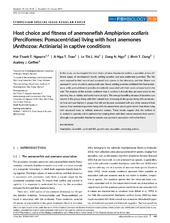Host choice and fitness of anemonefish Amphiprion ocellaris (Perciformes: Pomacentridae) living with host anemones (Anthozoa: Actiniaria) in captive conditions
Peer reviewed, Journal article
Published version

Åpne
Permanent lenke
https://hdl.handle.net/1956/23253Utgivelsesdato
2019Metadata
Vis full innførselSamlinger
Originalversjon
https://doi.org/10.1111/jfb.13910Sammendrag
In this study, we investigated the host choice of naïve Amphiprion ocellaris , a specialist, at two different stages of development (newly settling juveniles and post‐settlement juveniles). The fish were exposed to their natural and unnatural host species in the laboratory and their fitness was assessed in terms of activity and growth rate. Newly settling juveniles exhibited little host preference, while post‐settlement juveniles immediately associated with their most common host in the wild. The analysis of fish activity confirmed that A. ocellaris is diurnal; they are most active in the morning, less at midday and barely move at night. The average travelling distance of juveniles was shorter in the groups living with their natural host, increasing in the groups living with an unnatural host and was highest in groups that did not become associated with any other unnatural host species. Post‐settlement juveniles living with the natural host species grew better than those living with unnatural hosts or without anemone contact. These results suggest that the welfare of A. ocellaris in captivity will be optimized by keeping them with their natural anemone host species, although more generalist Amphiprion species may survive in association with other hosts.
